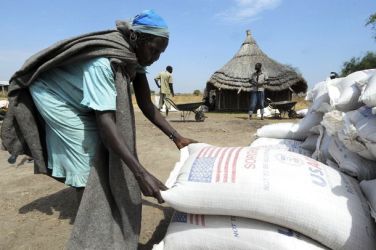Severe food shortages hit Bahr el Ghazal
March 2, 2012 (JUBA) – The United Nations (UN) has warned that more than half of South Sudan’s ten states will suffer severe food shortages this year. Unity State, parts of Upper Nile, Jonglei, Warrap, Central Equatoria and Northern Bahr El Ghazal have a cereal deficit of 70%, according to the UN.

“Households will face significant difficulty obtaining food during this period. Volatile food supply and poor diets are likely to intensify the severity of the hunger season”.
Funding shortages mean that 288,000 South Sudanese in Unity, Upper Nile, Jonglei and Northern Bahr El Ghazal states will be left without agricultural support, UN partners have said. However, around the same number, approximately 282,000 people, will benefit from tools, seeds and livestock, according to the report.
Partners of the UN are prepositioning farming inputs for 282,000 people in the four states of Unity, Upper Nile, Jonglei and Northern Bahr El Ghazal. Due to funding shortfalls, however, a further 288,000 people in those four affected states will be left without agricultural support, partners warn.
Funding shortfalls have also meant that “no farming assistance has been planned for Warrap, which has a further 31,000 households in need and unsupported”.
Northern Bahr el Ghazal
Local leaders from South Sudan’s Northern Bahr el Ghazal State told Sudan Tribune that they fear slipping into major food crisis, if no immediate attention is paid before rainy season begins.
Many attribute the causes of the looming food crisis in the area to the delayed and unreliable rainfall, which the state witnessed in 2011. The state government also links the cause to the closure of north-south border trade, which existed prior to official declaration of South Sudan as an independent state in July 2011.
The Juba government has identified the state as the most poverty stricken area followed by Warrap and Unity, according to the Director of National Bureau of Statistics (NBS), Isaiah Chol Aruai. Aruai says that half of the country’s 8 million people live on less a dollar a day.
Reports from humanitarian organisations including World Food Programme (WFP) also indicate that nearly a third of the country’s population could need food aid this year while many of the estimated 700,000 South Sudanese remaining in the neighbouring Sudan may soon to migrate to South Sudan. South Sudanese have until 9 April to apply for a work permit to remain in Sudan or to leave the country.
Valentino Achak Deng, a civil rights activist from Northern Bahr el Ghazal, said that last year’s harvest was poor, mainly due to late rains. Many internally displaced people had recently returned to their homes, he said, with little or nothing to support themselves. Prices of food items have drastically increased to their highest level ever, everywhere in the area, following the blockade of the north-South border.
“The indication is that 1988 famine seems to repeating itself and at worst case scenario than ever seen. You and I and able persons maybe at a position of supporting their immediate families, but my worry are that too many lives are at great risk. Lets shout out to every open ear that we need help in Northern Bahr el Gazal State! There is need for the State and federal Government, the civil society groups, the NGOs to join forces this time around to campaign against looming famine in the county”, Deng told Sudan Tribune in an email on Friday.
(ST)
